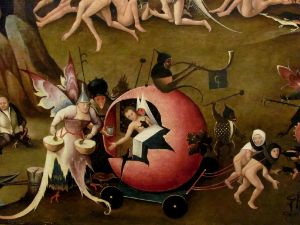Image (detail) The Last Judgment, Hieronymus Bosch, rocor, Flickr CC BY-NC 2.0
Who said the global economy was a permanent installation in the human condition? The head cheerleader was The New York Times’s Tom Friedman, with his 1999 book, The Lexus and the Olive Tree, the trumpet blast for the new order of things. Since then, we partied like it was 1999, with a few grand mal seizures of the banking system along the way, some experiments in creating failed states abroad, and the descent of America’s middle-class into a Disney version of Hieronymus Bosch’s Last Judgment — which is kind of what you see on the streets of Los Angeles these days.
Guess what: the global economy is winding down, and pretty rapidly. Trade wars are the most obvious symptom. The tensions underlying that spring from human population overshoot with its punishing externalities, resource depletion, and the perversities of money in accelerated motion, generating friction and heat. They also come from the fact that techno-industrialism was a story with a beginning, a middle, and an end — and we’re closer to the end than we are to the middle. There will be no going back to the prior party, whatever way we pretend to negotiate our way around or through these quandaries.
The USA-China romance was bound to end in divorce, which Mr. Trump is surreptitiously suing for now under the guise of a negotiated trade rebalancing. The US has got a chronic financial disease known as Triffin’s Dilemma, (https://dailyreckoning.com/the-triffin-dilemma/ Ed.), a set of disorders endemic to any world reserve currency. The disease initially expressed itself in President Nixon’s ditching the US dollar’s gold backing in 1971. By then, the world had noticed the dollar’s declining value trend-line, and threatened to drain Fort Knox to counter the effects of holding those dollars. Since then, all world currencies have been based on nothing but the idea that national economies would forever and always pump out more wealth.
It turns out that they pump out more debt in the pursuit of that chimerical wealth until the economic viziers and banking poohbahs begin to declare that debt itself is wealth — and now all the major players around the world are choking to death on that debt, especially the USA and China, but also Japan and the dolorous commune known as the EU. Everybody’s broke, one way or another, even though they are up to their eyeballs in products designed to fall apart in a few years. Better learn how to fix stuff, especially machines, because a lot of it won’t be replaced going forward.
Notice that Mr. Nixon’s escape from the dollar gold standard coincided with America’s first oil production peak. It was actually more than a coincidence, though it is unclear that anyone but James Schlesinger (then head of the Atomic Energy Commission, and later Secretary of Defense, Secretary of Energy, and CIA Director) understood what that signified. Now America is back at a second and even higher production peak thanks to the illusory boom of shale oil. The difference now is that only 10 percent of the companies producing it make a red cent. For the rest, the main result is just more and more debt, contributing to the larger global debt fiasco. It’s now down to a race between the sensational depletion rate of the shale oil wells and the country’s flagging capacity to generate more debt with a dim prospect of it ever being paid back.
Who knows whether the Golden Golem of Greatness and the people advising him in the White House get where all this is taking us in the history of the future. One might suppose it’s behind Mr. Trump’s wish to Make America Great Again, the vision of a return to the economy of 1955, of men toting lunchboxes through the factory gates, and seventy million boomer schoolchildren dreaming of trips to the moon, and the hard-fought, transient blessings of Pax Americana. All that is a comfort to simpletons, no doubt, but not wholly consistent with what can be observed actually going on — which is a culture and a political system seemingly bent on suicide.
The zeitgeist knows something that we don’t. The arc of this story follows the breakup of old arrangements, including trade relations, alliances, nation-states, and widespread expectations about what ought to be. Some observers claim the US will be the “last man standing” in this journey to the post global economy. (We surely would want to avoid a situation where nobody is left standing.) But all the participants in the orgy now ending will be left at least cross-eyed and flummoxed in the new cold dawn of a world without the old mojo. If the center is not holding, better look for a place on the margins as far from the emerging economic black hole as possible.
"James Howard Kunstler is the author of The Long Emergency, Too Much Magic, The Geography of Nowhere, the World Made By Hand novels, and more than a dozen other books. He lives in Washington County, New York," so says his website, Kunstler.com. He is, however, much more. During the past two decades, he has remained at the forefront of the alternative press, both online and in print, advocating against "Happy Motoring" and suburban lifestyles in favor of simpler, community-based living where people learn to rely on themselves and each other rather than corporations, government and our phony-baloney economy. His Monday and Friday Clusterfuck Nation blog gets the week off to a good beginning and closes it on a high note. He is also an accomplished painter who obviously enjoys the rural beauties of upstate New York where he has settled and detests contemporary culture's many eyesores. If this piece is your introduction to his work, check out his blog. If you know him well, support him at Patreon.
Reposted with permission of the author.



